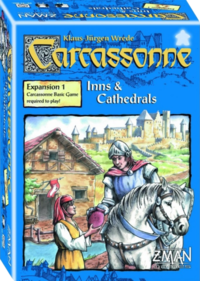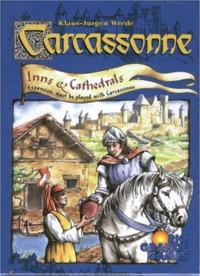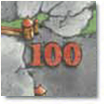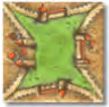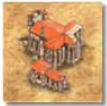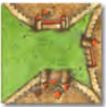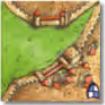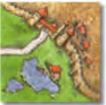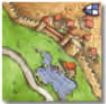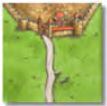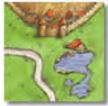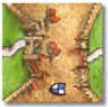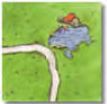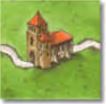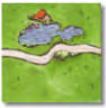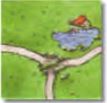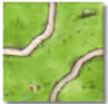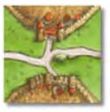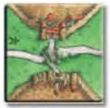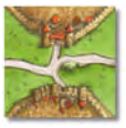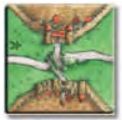Inns and Cathedrals (1st edition)
 |
You are reading the rules for this tile design. |
 | Read the following rules if your tiles look like this. |  |
| If your tiles have a different design, then choose a game from Spin-offs. |  |
General info and comments
Inns and Cathedrals was originally released by Hans im Glück in 2002. The tiles of the first German editions had no expansion symbol and had the name "Die Erweiterung" and not "Inns and Cathedrals".
This expansion is the first major expansion for Carcassonne and introduces a few new aspects to the game.
Contents
- 18 new Land tiles with a meeple symbol.
- 6 scoring tiles, double sided with 50 on one side and 100 on the other.
- 8 grey followers to use for a 6th player. [1]
- 6 big followers (one for each color)
There are some tiles with special characteristics:
 |
This tile has four unconnected city segments. |
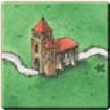 |
The cloister divides the road into two segments. |
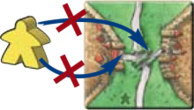
|
The crossing divides the road into two segments. The thieves may not be placed on the designated spots. |
Rules
Preparation
The 18 tiles should be mixed with the rest of the tiles.
Place a tile
The new land tiles are placed in the usual way. Take care with the tiles shown beneath. [2]
Deploy a follower
Instead of deploying a normal follower, a player may now decide to deploy his or her big follower. This counts as one follower and is deployed according to the usual rules. [3]
During scoring, however, the big follower counts as if the player had deployed two normal followers to the road, city, cloister, or farm in question.
A player with a big follower DOES NOT score twice as many points. The big follower is dealt with in exactly the same way as two normal followers; for two followers in a city, on a road, or on a farm, you only earn points once. The only function of the big follower is to obtain the majority more quickly. For example, in a cloister the big follower earns precisely the same number of points as a smaller follower.
Like any other follower, the big follower is returned to the player after scoring, and can be deployed again in the next turn. If the big follower is deployed as a farmer, it remains on the farm until the end of the game, just like other farmers.
![]() Question: [If captured by a tower,] is the ransom for the big follower doubled?
Question: [If captured by a tower,] is the ransom for the big follower doubled?
Answer: No: he may be big, but he's still only one person.
Score completed roads, cities or cloisters
A completed road : "Inns by a Lake"
There are 6 tiles featuring an inn by a lake. [4]
If a road which has one or more inns lining it is completed, then the thief scores 2 points for every road segment, according to the number of tiles. However, if such a road has not been completed at the end of the game, it scores no points during the final scoring. Note that an inn affects only the road segment that it is immediately adjacent to, not all segments on the tile.
A completed city : Cathedrals
There are 2 city tiles featuring a cathedral.
If a city which contains one or more cathedrals is completed, then the knight scores 3 points for every city segment, according to the number of tiles, and 3 points for every pennant. However, if such a city has not been completed at the end of the game, it scores no points during the final scoring.
![]() Question: Am I allowed to place cathedrals in other players' cities?
Question: Am I allowed to place cathedrals in other players' cities?
Answer: Yes, that is allowed, and is particularly useful towards the end of a game, when it can strip a large city of an opponent of points. The same goes for roads with inns.
Tile distribution
There is a difference between the original game and the ![]() Big Box 1 version, see footnote [2]
Big Box 1 version, see footnote [2]
| OR |
Footnotes
For Icons explanation and licensing please visit Icons page.
- ↑
 In the
In the  Big Box 1, the sixth set of followers is part of the basic game and is described there.
Big Box 1, the sixth set of followers is part of the basic game and is described there.
- ↑ Jump up to: 2.0 2.1
 In the case of the following tile, the
In the case of the following tile, the  Big Box 1 set (and more recent prints of Inns & Cathedrals) contains a more clearly drawn junction, as this comparison illustrates:
Big Box 1 set (and more recent prints of Inns & Cathedrals) contains a more clearly drawn junction, as this comparison illustrates:
 The original rules point out, as do the ones in the
The original rules point out, as do the ones in the  Big Box 1, that a thief may not be placed on the short roads leading from each city to the junction, but it is not at all clear on the original tile that the road which leads between the cities is broken by the junction. The new tile is obviously meant to remind us that all junctions are considered to be ends of roads, and you are advised to follow this rule even when playing with the original tile.
Big Box 1, that a thief may not be placed on the short roads leading from each city to the junction, but it is not at all clear on the original tile that the road which leads between the cities is broken by the junction. The new tile is obviously meant to remind us that all junctions are considered to be ends of roads, and you are advised to follow this rule even when playing with the original tile.
 In the
In the  Big Box 4 rules by ZMG, the arrows that are supposed to point to the paths that a thief cannot be placed on actually point to the valid road segments. (1/2014)
Big Box 4 rules by ZMG, the arrows that are supposed to point to the paths that a thief cannot be placed on actually point to the valid road segments. (1/2014)
- ↑
 These two sentences offer clarifications not contained in the previous rules: that a big follower is only one follower, although it counts as two during scoring; and it may only be deployed instead of a normal follower.
These two sentences offer clarifications not contained in the previous rules: that a big follower is only one follower, although it counts as two during scoring; and it may only be deployed instead of a normal follower.
- ↑
 It is worth pointing out that this description seems to exclude the spring tile from
It is worth pointing out that this description seems to exclude the spring tile from  Games Quarterly #11 which contains what looks like an inn, but does not feature a lake.
Games Quarterly #11 which contains what looks like an inn, but does not feature a lake.
